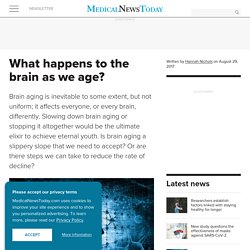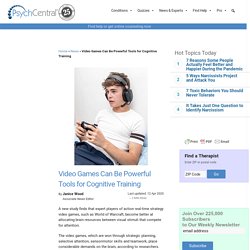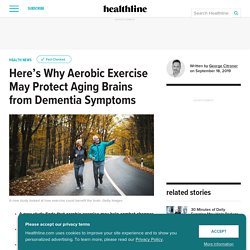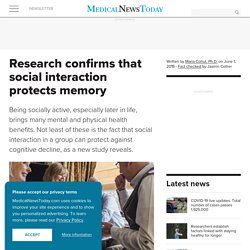

In recent years, considerable attention has been placed on identifying interventions that are useful in boosting cognitive functioning and delaying the onset of cognitive decline among the increasing older population. United Nations. The world’s population is ageing: virtually every country in the world is experiencing growth in the number and proportion of older persons in their population.

Population ageing is poised to become one of the most significant social transformations of the twenty-first century, with implications for nearly all sectors of society, including labour and financial markets, the demand for goods and services, such as housing, transportation and social protection, as well as family structures and intergenerational ties. Older persons are increasingly seen as contributors to development, whose abilities to act for the betterment of themselves and their societies should be woven into policies and programmes at all levels. Excerpt to article: Ageing. Aging and cognitive abilities. Excerpt to video: Aging and cognitive abilities. What happens to the brain as we age? Brain aging is inevitable to some extent, but not uniform; it affects everyone, or every brain, differently.

Slowing down brain aging or stopping it altogether would be the ultimate elixir to achieve eternal youth. Is brain aging a slippery slope that we need to accept? Or are there steps we can take to reduce the rate of decline? At around 3 pounds in weight, the human brain is a staggering feat of engineering with around 100 billion neurons interconnected via trillions of synapses. Throughout our lifetime our brain changes more than any other part of our body. During the first few years of life, a child’s brain forms more than 1 million new neural connections every second. Prevalence of Dementia. Dementia Incidence Increases with Age. Early retirement may accelerate dementia, study finds. How an early retirement 'can speed up dementia': Scientists find quitting work before turning 60 'accelerates cognitive decline and memory loss' New York scientists say it is caused by a lack of mental stimulation when retired Retirement is also usually accompanied by less interaction with other people This has also been linked to cognitive decline and development of the disease By Connor Boyd Health Reporter For Mailonline Published: 06:34 EDT, 31 October 2019 | Updated: 10:50 EDT, 31 October 2019 Many of us dream of an early retirement, when we can finally book that once-in-a-lifetime holiday and switch off.

But younger retirees may be more likely to develop dementia than those who work until old age, research suggests. Scientists found quitting work before the age of 60 accelerated cognitive decline and stifled memory in later life - traits of the memory-robbing disorder. They believe it is caused by a lack of mental stimulation that employees experience during the working day. UCLA Alzheimer’s and Dementia Care Program. Challenges of cognitive decline. Importance of early treatment. Mayo Clinic Minute: Brain activities decrease dementia risk. An alternative to drug-based therapies. 7 Mind Stimulating Activities & Cognitive Games for Seniors. Just as physical exercise strengthens and trains our bodies, cognitive training and exercise stimulates the brain, helping it grow and develop new connections as we age.
The more we challenge the mind (through various forms of mental exercise), the better it is at processing information. As family caregivers, we want to be sure our loved ones remain healthy in every aspect – including their mental health. Approaches to improve cognitive abilities. Video Games Can Be Powerful Tools for Cognitive Training. A new study finds that expert players of action real-time strategy video games, such as World of Warcraft, become better at allocating brain resources between visual stimuli that compete for attention.

The video games, which are won through strategic planning, selective attention, sensorimotor skills and teamwork, place considerable demands on the brain, according to researchers. Previous research has shown that playing video games can improve cognitive development, such as greater sensitivity to contrasts, better eye-to-hand coordination, and superior memory. But researchers note the long-term effects of gaming on a key cognitive function called temporal visual selective attention — the capacity to distinguish between important and irrelevant information within a rapid stream of visual stimuli — has never been studied. “Our aim was to evaluate the long-term effect of experience with action real-time strategy games on temporal visual selective attention,” said author Dr. Source: Frontiers. New technologies keeps people learning and engaged. Aerobic Exercise May Protect Aging Brains from Dementia Symptoms.
A new study finds that aerobic exercise may help combat changes in the brain associated with dementia.But any kind of exercise is associated with a decreased risk of developing Alzheimer’s disease or dementia.

Physiological and cognitive benefits of physical exercise. Research confirms that social interaction protects memory. Being socially active, especially later in life, brings many mental and physical health benefits.

Not least of these is the fact that social interaction in a group can protect against cognitive decline, as a new study reveals. The idea that having a rich social life can help to protect an individual’s health is by no means a new one. Neither is the notion that older people who stay closely in touch with friends preserve better memory and other cognitive abilities for a longer time than their more solitary peers. The question has always been, “Does sociability protect cognitive abilities, or do those who live with memory impairment tend to shun social activities?” Researchers from Ohio State University in Columbus have decided to try to clarify this issue. In existing research working with mouse models, the investigators gave some of the animals plenty of opportunities to interact with their environment and to explore, while others were given fewer such opportunities.
Social interaction: Protecting against cognitive decline. Mediterranean diet may offer special health benefits for this age group. There's yet another reason to try the Mediterranean diet, new research has found.

Among elderly individuals, adhering to a diet rich in vegetables, fruit, whole grains, beans, nuts, seeds and olive oil for one year was linked to changes in gut microbiota associated with less fragility and better cognitive function. The Mediterranean diet previously has been associated with a host of health benefits, including lower cardiovascular disease risk and longer life expectancy. The study, published Monday in Gut, a British Medical Journal publication, analyzed the gut microbiota of 612 study participants between the ages of 65 and 79. Roughly half of the participants were assigned a Mediterranean diet, while others were control subjects.
Over the course of 12 months, the study participants assigned the Mediterranean diet were less likely to lose diversity in their gut microbiota. Consuming enough Vitamin D may help reduce dementia and prevent heart disease. Vitamin D is listed as one of the essential nutrients.

Fortunately, your body produces its own vitamin D when you are exposed to sunlight. It is also found in foods like fortified milk, orange juice, eggs, fatty fish like salmon, and some mushrooms. There are many benefits vitamin D provides to our bodies. You are probably aware of its primary benefit, which is in preventing osteoporosis and other bone diseases. However, scientists are beginning to learn more about how vitamin D may be responsible for mitigating some symptoms of chronic diseases. Vitamin D is synthesised as a hormone, acting as a messenger to regulate body processes that may have an impact on a range of conditions, which we will discuss in further detail later. Bear in mind that most of the findings on vitamin D are mainly observational (versus a properly-controlled randomised trial), but it is good to know what vitamin D may do for our health.
Chronic conditions Osteoporosis Vitamin D helps with calcium absorption. Cancer. Healthy brain food. Importance of staying active. List of references.